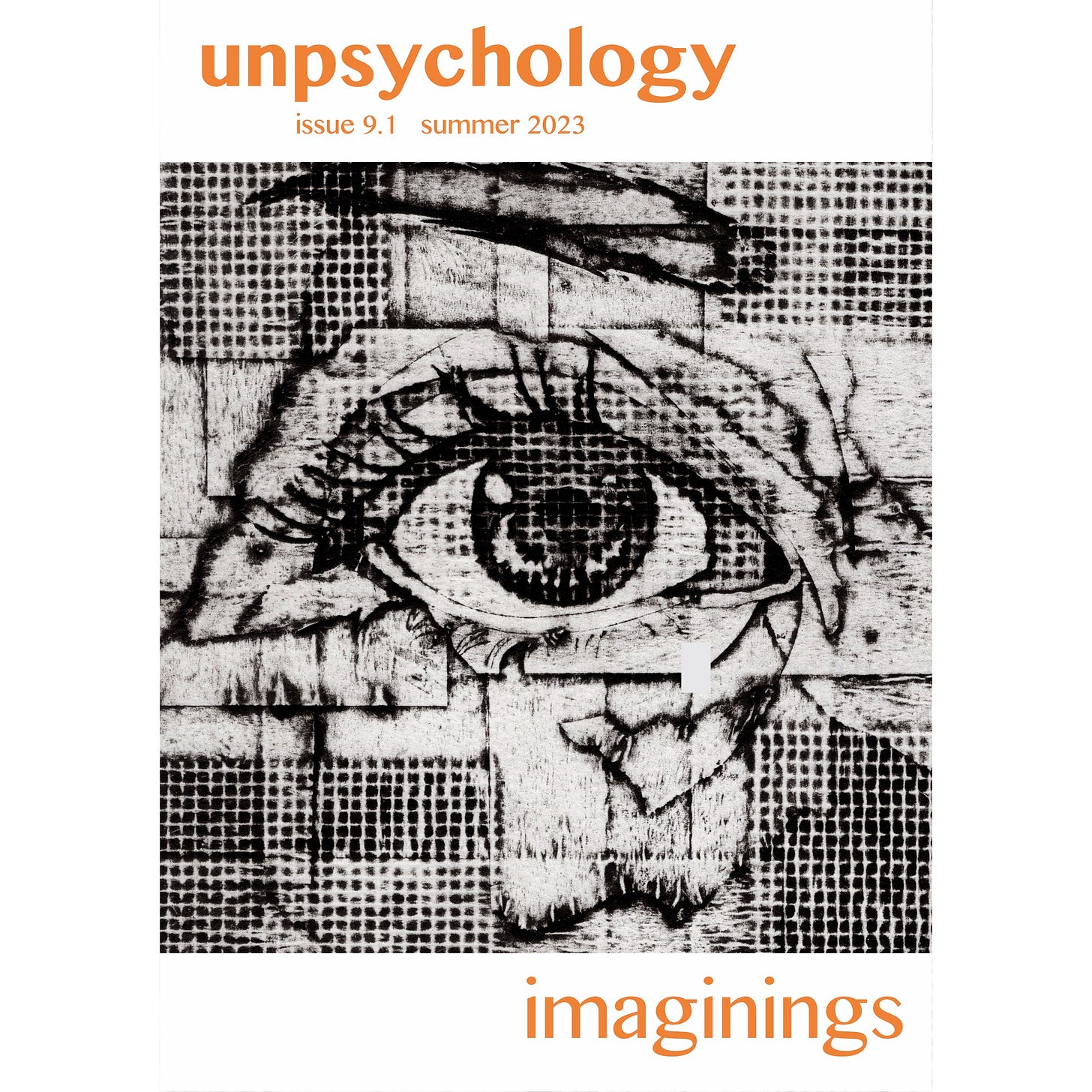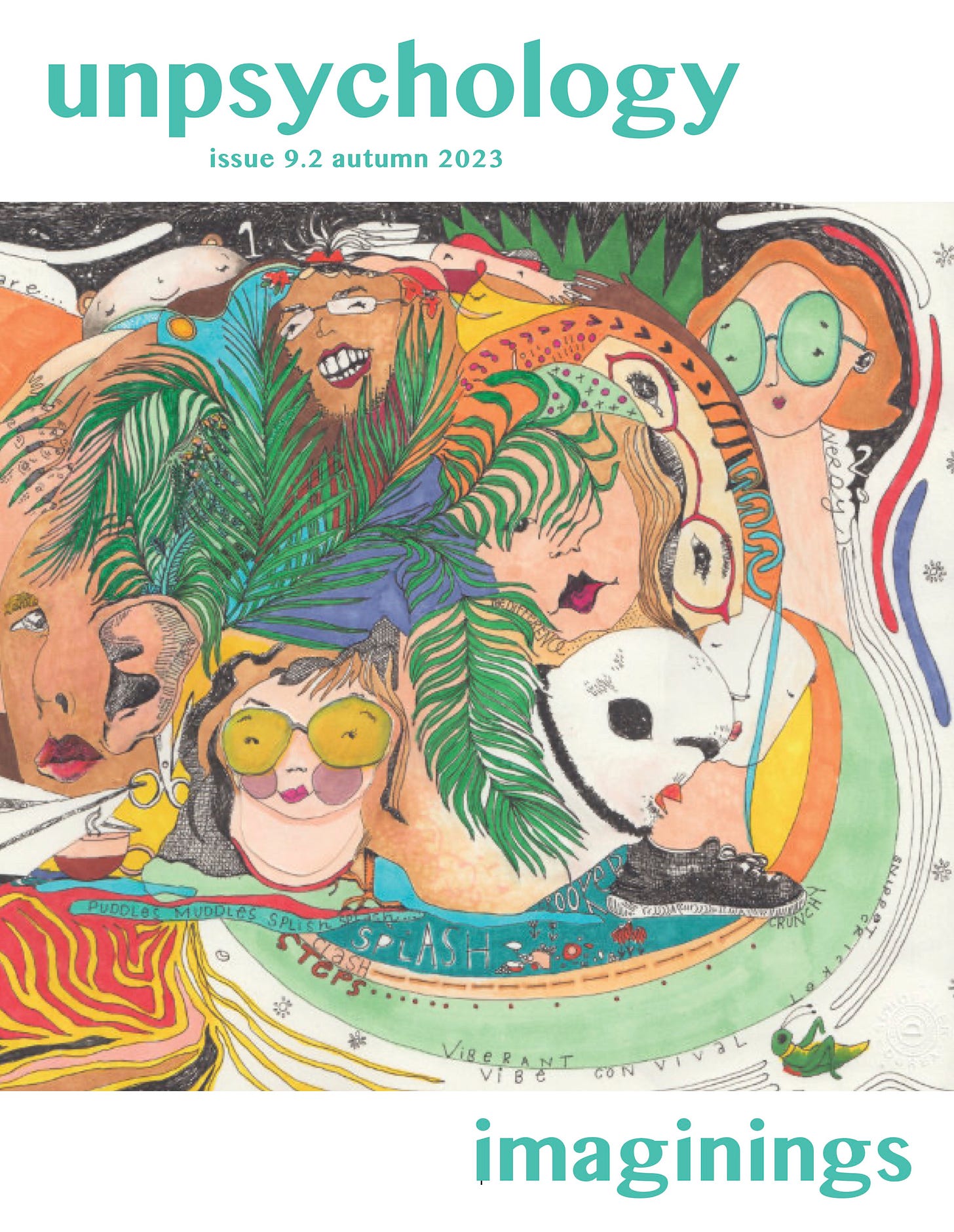The oft-cited cliche that we only learn from our mistakes is, of course, bollocks. We might learn shame from our mistakes and learn not to show them to anyone we think might judge us (particularly those who might employ us at any time), but anything this reductionist and trite is missing a whole lot of context!
Of course, everyone makes mistakes – its just that one of the cultural tasks of our time is to cover them up, minimise them, pretend they didn't happen – or run away. All of which I have done in the many decades of my glitchy existence.
This post is being written because of a mistake – or a ‘glitch’ as I am going to call it, implying that it was the result of malfunctioning technology or apps not communicating properly. However, it was in truth a mistake. I blooped, boobed and then couldn’t work out how to fix it.
Sooooo, the thing is, this post is a fess up. It will enable you to fix the glitch that you may have found deep in the first of our Unpsychology Imaginings magazines. The next paragraph will tell you what the problem/glitch/mistake is, and what I have done to offer a temporary fix. And in the paragraph after that I will say a bit more about glitches and reflect on whether they can, after all, be fun and whether there might even be deeper meaning to be found in messing things up (you can skip that bit if you want!).
The mistake/glitch
In Unpsychology 9.1 - the first Imaginings edition – we wanted to make a truly multi-media publication with URLs and QR codes linking to music and video from our creators and artists. We thought we had succeeded, and the magazine is truly wonderful (we think) in both PDF and print versions.
Howeeeever, along the way some of the music files became ‘de-linked’ somehow, and the QR codes took readers to blank pages on Soundcloud. By now, the mags had been published and printed, and the codes couldn’t be ‘re-linked’. So we came up with an old-school solution - a correction sheet! Back in the day, every book worth its salt came with a correction sheet, so I’m pretty proud of this one.
So, if you have a PDF or print copy of the Magazine (Unpsychology 9.1 imaginings) and would like to access all the wonderful music that appeared in that edition, you can. Just download the correction sheet from the button below. That should fix it!
If, on the other hand, you haven’t even got your copies of the Unpsychology Imaginings editions of the magazine (9.1 and 9.2) you can still get them FREE to download - along with all past editions of the magazine. Print editions are also available in beautiful full colour (and now surround-sound - if you follow the links on the correction sheet!). By the way, the QRs and links in the second magazine (9.2) were still working the last time we looked, so no glitches there (so far).
The meaning of mistakes
If you want to join me further into a short consideration of mistake-making and what we have come to make of it at Unpsychology, then read on.
In truth, every project is beset by mistakes and glitches. And our cultural and political life is full of them, many of which have such disastrous consequences that they are hard to comprehend, and even harder to put right. These ‘big’ mistakes are what history is made of – and we live with their outcomes in both short and long-term. They form the troubled times we live with right now and are the contexts in which Unpsychology is created.
We’re stuck with these glitches – we can’t turn them back. These mistakes have given power and privilege to the wrong people, and turned our cultures into places where conflict, conspiracy and disinformation have come to outweigh material objectivity and truth. There’s no correction sheet that can change mistaken minds when they get hold of a glitch of an idea. And because glitches always contain a seed of truth that invites straight-line opinions, the ecology of mistaken context can grow and grow and grow…
However, there might be another way of thinking about mess-ups. Our design editor,
, has a way of putting her finger on the truth around glitches, mistakes and unconformities. She sees mistakes as an inevitable part of complexity and humanity, and as opportunities for creativity and conversation. She says we should embrace them and recognise their place right at the heart of the creative process.Imperfection is in everything - the epitome of being human. The glitch is the key to evolutionary process of being alive…
And without getting too deep into the weeds here, wherever there is a glitch, there is a place where learning can be done - together. The things we might have to do are to notice the mistake, then become aware of its consequences and then, together, talk about the choices we might want to make in the light of this. The choice we take together might not be the obvious one. There may be other ways round, and taking these untrodden paths might bring us to somewhere unexpected and may even change history, though we will never know its potential at the time…
Submissions welcome - with glitches or not…!
And finally, don’t forget that we are still inviting glitchy and imperfectly beautiful submissions to our 10th anniversary issue of Unpsychology, with the theme of Edges. You have until the end of February to get these in to us and you can find the submissions guidelines HERE:









I make lots of mistakes, and have certainly felt (and store) the shame that accompanies then, and … at other times I’ve celebrated them as collaborations from an unknown source. Perhaps I celebrate and cringe at the same time.
But creative work thrives on mistakes I think, or it has in my case as they relieve me from the burden of doing things “correctly”, which I find completely paralysing.
After all the whole concept of a mistake seems to be a purely human one, related to an intended outcome. Other non-human animals and other forms of life just acquire differences in response to whatever is happening. Sometimes incredibly useful or beautiful, and sometimes ultimately fatal. Whether the mistake is “bad” or “good” probably depends on how it meets the surrounding conditions.
There’s some kind of unspoken social pact though that perpetuates the idea that mistakes are always bad, and discourages us from making them our celebrating them. Seems such a waste of creative potential for new responses. And conversely, each mistake I make or see could be a friendly flag of encouragement for more of the same.
As you say Steve, some mistakes have incredibly negative consequences but perhaps it’s not the mistake itself that is the problem but the unrealistic goals we put in place that make disastrous mistakes more likely.
I notice writing this, the risk that I have “written too much” or become longwinded and boring. A kind of mistake relating to the social pact that I perceive and suffer from. So in the spirit of non-compliance to that system, I’ll just post it anyway.
Have a nice day everyone, mistakes and all!
In her book 'The World is a Carpet' Anna Badkhen tells that when a carpet goes to market, the first thing the dealers look for is a mistake. Perfection belongs to Allah and the carpet would be unsaleable. Once they find a glitch, they are happy to give a price.
Much more human than the guilt of 'original sin'